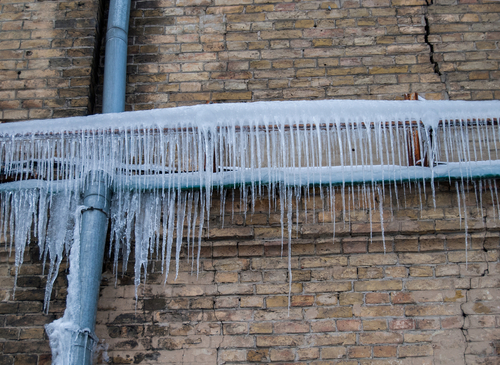Key Methods for Avoiding Frozen Pipes in Cold Weather
Key Methods for Avoiding Frozen Pipes in Cold Weather
Blog Article
We have noticed the article about Winter Plumbing Precautions: Preventing Frozen Pipes below on the internet and figured it made sense to share it with you over here.

Cold weather can damage your pipes, especially by freezing pipelines. Below's how to stop it from occurring and what to do if it does.
Introduction
As temperatures decline, the danger of frozen pipelines rises, potentially bring about expensive repairs and water damage. Understanding how to avoid icy pipes is essential for house owners in cold environments.
Avoidance Tips
Protecting prone pipelines
Cover pipes in insulation sleeves or make use of heat tape to safeguard them from freezing temperatures. Concentrate on pipes in unheated or external areas of the home.
Home heating methods
Keep indoor areas effectively warmed, particularly locations with pipes. Open cupboard doors to allow warm air to distribute around pipelines under sinks.
Exactly how to identify icy pipelines
Seek reduced water flow from taps, uncommon smells or sounds from pipes, and visible frost on revealed pipelines.
Long-Term Solutions
Architectural changes
Take into consideration rerouting pipelines away from outside wall surfaces or unheated locations. Add additional insulation to attic rooms, basements, and crawl spaces.
Updating insulation
Invest in high-grade insulation for pipelines, attic rooms, and walls. Correct insulation aids preserve consistent temperatures and lowers the danger of frozen pipelines.
Shielding Outdoor Pipes
Yard pipes and outdoor faucets
Detach and drain yard pipes prior to winter months. Install frost-proof faucets or cover exterior faucets with protected caps.
Comprehending Icy Pipes
What creates pipelines to ice up?
Pipes ice up when subjected to temperature levels listed below 32 ° F (0 ° C) for expanded durations. As water inside the pipelines freezes, it increases, putting pressure on the pipeline wall surfaces and potentially triggering them to break.
Risks and problems
Frozen pipes can cause water disruptions, residential or commercial property damages, and costly repairs. Ruptured pipelines can flooding homes and trigger substantial architectural damages.
Indicators of Frozen Piping
Identifying frozen pipes early can stop them from rupturing.
What to Do If Your Pipes Freeze
Immediate actions to take
If you presume icy pipes, maintain faucets available to soothe pressure as the ice thaws. Utilize a hairdryer or towels taken in warm water to thaw pipes slowly.
Verdict
Protecting against frozen pipelines calls for proactive actions and quick responses. By understanding the causes, indications, and preventive measures, house owners can safeguard their pipes throughout winter.
Helpful Tips to Prevent Frozen Pipes this Winter
UNDERSTANDING THE BASICS: WHY PIPES FREEZE AND WHY IT’S A PROBLEM
Water freezing inside pipes is common during the winter months, but understanding why pipes freeze, and the potential problems it can cause is crucial in preventing such incidents. This section will delve into the basics of why pipes freeze and the associated problems that may arise.
THE SCIENCE BEHIND FROZEN PIPES
When water reaches freezing temperatures, it undergoes a physical transformation and solidifies into ice. This expansion of water as it freezes is the primary reason pipes can burst. As the water inside the pipe freezes, it expands, creating immense pressure on the walls. If the pressure becomes too great, the pipe can crack or rupture, leading to leaks and water damage.
FACTORS THAT CONTRIBUTE TO PIPE FREEZING
Low Temperatures: Extremely cold weather, especially below freezing, increases the risk of pipes freezing. Uninsulated or Poorly Insulated Pipes: Pipes located in unheated areas, such as basements, crawl spaces, or attics, are more prone to freezing. Insufficient insulation or lack of insulation altogether exacerbates the problem. Exterior Wall Exposure: Pipes running along exterior walls are susceptible to freezing as they encounter colder temperatures outside. Lack of Heating or Temperature Regulation: Inadequate heating or inconsistent temperature control in your home can contribute to frozen pipes. PROBLEMS CAUSED BY FROZEN PIPES
- Pipe Bursting: As mentioned earlier, the expansion of water as it freezes can cause pipes to burst, resulting in significant water damage.
- Water Damage: When pipes burst, it can lead to flooding and water damage to your property, including walls, ceilings, flooring, and personal belongings.
- Structural Damage: Prolonged exposure to water from burst pipes can compromise the structural integrity of your home, leading to costly repairs.
- Mold and Mildew Growth: Excess moisture from water damage can create a favorable environment for mold and mildew growth, posing health risks to occupants.
- Disrupted Water Supply: Frozen pipes can also result in a complete or partial loss of water supply until the issue is resolved.
WHY CERTAIN PIPES ARE MORE PRONE TO FREEZING
- Location: Pipes located in unheated or poorly insulated areas, such as basements, crawl spaces, attics, or exterior walls, are at higher risk of freezing.
- Exterior Pipes: Outdoor pipes, such as those used for irrigation or exposed plumbing, are particularly vulnerable to freezing as they are directly exposed to the elements.
- Supply Lines: Pipes that carry water from the main water supply into your home, including the main water line, are critical to protect as freezing in these lines can affect your entire plumbing system.
- Underground Pipes: Pipes buried underground, such as those connected to sprinkler systems or outdoor faucets, can be susceptible to freezing if not properly insulated.
https://busybusy.com/blog/helpful-tips-to-prevent-frozen-pipes-this-winter/

Do you appreciate reading up on Preventing and dealing with frozen pipes? Write feedback down below. We would be glad to see your responses about this article. We are looking forward that you visit us again in the near future. Are you aware of somebody who is fascinated by the topic? Be sure share it. I praise you for your time. Come back soon.
Schedule A Service Call Report this page